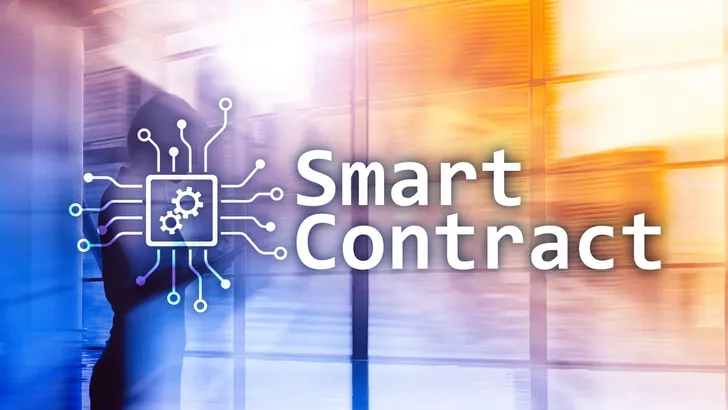Smart Contracts Explained: What Are They Used For?

crypto basics
Do you ever wish there was some sort of automated or smart contract that executed itself as soon as all the terms and conditions were met?
The truth is, such contracts do exist. Unfortunately, they aren’t widely used, at least not to their full potential. Currently, smart contracts are mostly related to blockchain and Web3. Even though their creation and execution have been simplified compared to a few years ago, they are not fully implemented yet.
But what could be the meaning of smart contracts? What are they used for, and how are they created? Read on to find out.
What Are Smart Contracts?
A smart contract represents self-executing software that automates actions required by a contract or agreement. This digital contract is stored on a blockchain and runs on a special virtual machine. Once executed, a smart contract cannot be reversed, and all its actions or transactions can be tracked.
One of the advantages of smart contracts over traditional contracts is that they don’t call for the involvement of middlemen or other third parties. Therefore, they allow for carrying out confidential and trusted agreements or transactions without involving central authorities, government or legal systems, or other external enforcement mechanisms.

As such, smart contracts are ideal for money exchange, service delivery, and decrypting content protected by digital rights management. In addition, smart contracts can be implemented to enhance privacy protection.
Lastly, they can automate a workflow, starting another action when all terms and conditions are satisfied. Hence, you can find smart contract examples in almost any industry, ranging from real estate and finance to entertainment.
It’s good to know that, in spite of their name, these self-executing contracts aren’t legally binding. They don’t include any legal language, terms, or agreements.
Namely, smart contracts consist of codes that execute actions once the predetermined conditions are met. Their primary function is to automate the execution of business logic and thus perform a range of tasks, processes, or transactions that were programmed to respond to a particular set of conditions.
To make such an execution legally binding, the parties entering into the agreement need to take specific legal steps.
How Do Smart Contracts Work?
Smart contracts function by following the principle of “if/when...then…” statements. Those statements are included in the code, so once the network of computers verifies the conditions, the actions given in the contract will be automatically executed.
Smart contract actions may vary.
For instance, they can include sending funds, registering a vehicle, issuing a ticket, or sending notifications. As soon as a transaction is finished, the blockchain network is updated. The participating parties aren’t the only ones who can see the final results. However, no one whatsoever can change the transaction.
These are the necessary steps to build a smart contract:
- Identify parties and set the terms of an agreement.
- Determine conditions for the execution of a contract.
- Develop smart contract code.
- Deploy the smart contract on the blockchain network.
- Trigger the automatic execution of a contract.
- Record contract details on the blockchain.
There can be numerous terms and conditions to meet to make sure that the task will be completed successfully.
To set them, participants first need to define how transactions are represented on the blockchain. Next, they formulate the “if/when…then…” rule that will manage the transactions, explore potential exceptions, and determine a framework for resolving disputes. When all the conditions and rules are defined, a developer sets out to create a smart contract.
History of Smart Contracts
The idea of self-executing contracts dates back to 1994 when Nick Szabo defined them as “computerized transaction protocols that execute the terms of a contract.”
Nick Szabo, a computer scientist from the USA, is a household name in the world of cryptocurrency. He created the first virtual currency, dubbed Bit Gold, in 1998. Due to this, many people believe that Szabo is the actual Satoshi Nakamoto—the anonymous Bitcoin creator—which he said was not true.
Regarding smart contracts, Szabo’s goal was to expand the functionality of electronic transaction methods, one of which is point of sale (POS), to the digital space. He also proposed the automatization of contracts for synthetic assets—derivatives and bonds—in his paper.
Today, derivatives trading is mostly done via computer networks implementing complex structures. This is only a portion of his progressive ideas, which came true much before the blockchain technology we know now was invented and developed.
5 Benefits of Smart Contracts
In addition to facilitating and automating execution, as well as removing intermediaries, smart contracts have other advantages.
Here are some of them:
- Transparency. Since they are blockchain-based, smart contracts promise the immutability of data. This further prevents potential breaches of conditions or mistakes in contract execution. Such transparency guarantees trust and security for participants. The parties have a record of the transactions, given that all of them are duplicated. This way, all data and information pertaining to the contract are available to everyone.
- Autonomy. Smart contracts allow for making agreements without the need for middlemen to intervene in the process. Thus, the parties have full autonomy and independence. Such autonomy further leads to faster execution of the processes as well as lower costs.
- Cost reduction. Since there are no middlemen, the costs of executing contracts are automatically reduced. The intermediary fees are non-existent, as there is no third party to vouch for the trust. This is particularly beneficial for cross-border cash flow, as smart contracts eliminate transfer fees.
- Speed. Besides lowering expenses and providing autonomy, smart contracts reduce the time necessary for their execution. Since everything is automated, it takes less time to complete all the stepscompared to traditional contracts carried out manually in the presence of an intermediary.
- Automatically-triggered execution. Being written as computer codes, smart contracts are executed when the pre-defined conditions are satisfied. Once they are met, the code triggers the executions immediately. This is of particular significance when it comes to transferring money or ownership, as there is no unnecessary waiting for the processes to finish.

Smart Contracts Use Cases
Transferring money or ownership is not the sole use case of smart contracts. On the contrary, there are various prospective applications for these contracts.
Due to their flexibility, self-executing contracts can be used in a range of industries. Developers can store nearly any type of data on the blockchain; plus, there is a pool of transaction options to choose from.
Though blockchains are not necessary for smart contracts to function, this technology helps them preserve their security and immutability. Thus, digital contracts make not only transactions but also other business processes more cost-effective, secure, and efficient.
These are some of the smart contract use cases.
#1. Real Estate
Buying or selling a property can be a complicated and tedious endeavor. Considering how much paperwork it’s necessary to do, it’s no wonder why many sellers opt to hire a property lawyer. While this can spare a lot of your time, it can cost you a lot of money, given how high their fees can be.
Smart contracts can save you both time and money. This small but powerful software can facilitate property transfers and make sure they are safe and secure. There are no intermediaries whatsoever, only the buyer and the seller.
Imagine that your house is tokenized on the Ethereum blockchain. Once you want to sell it, you create a smart contract with the buyer. The contract would hold your asset, i.e., your house until the buyer transfers all the funds.
This way, both parties win—the seller saves money on fees, whereas the buyer obtains a new property much sooner than they might have expected.
#2. Insurance
Insurance is yet another category where smart contract applications would be of great benefit.
By signing up for a policy, prospective users enter into a contract with the insurance provider. The smart contract already includes all the requirements; the user should only read and sign it.
The smart contract would stay open until the party needed it. Once they upload the documents that prove the need for payment, the funds will be automatically released. There would be no need to reach out to insurance companies or their representatives.
The only necessary documentation here is proof of the requirement. Once it’s submitted, the transfer of funds takes place almost instantly.
3. Supply Chain Management
The supply chain is possibly the most widespread application of smart contracts. The complex network of supply chains—farmers, warehouses, and grocery stores—demands an efficient way to track product custody and payments.
Smart contracts have the power to automate all parts of the chain to increase their responsibility. They could help automatically execute all steps of the transaction. These contracts would include all necessary data about product specifications, shipping information, terms of payment, and deadlines.
To vouchsafe that products are in accordance with the buyer’s anticipation, smart contracts should include conditions for the item’s quality and quantity.

Since everything is predetermined, self-executing, and non-negotiable, there should be no need for intermediaries like banks, as well as the fees associated with them.
#4. Intellectual Property Rights
Another significant application of smart contracts would be in the field of intellectual property rights, mainly copyrights and patents.
Namely, smart contracts allow creators to not only protect their intellectual property but also to obtain adequate compensation for their work. Creating digital assets like NFTs with smart contracts would help creators achieve this.
These assets would represent rights, whereas smart contracts would manage ownership and licensing.
#5. Automatic Investing
Smart contracts can automate your investment activities. This can be immensely time-saving, as you wouldn’t have to waste your time and energy monitoring price movements. Instead, you can set the parameters and wait for the activity to get done once all the rules are met.
Though quite efficient, automating investments this way can be risky as you don’t have much control over buying and selling assets.
How Are Smart Contracts Created?
To create a smart contract, the party that needs it teams with a developer who will code it. The parties elaborate on their requirements for the desired behavior as well as responses to different situations.
Once they have all the conditions and requirements, the developer sets out to work on a smart contract platform to develop the logic. Having coded it, they test it to make sure the contract works as required.
After the developer creates the software, they send it to another team for a security review. This may be an internal expert or a company that specializes in vetting smart contract security. When they approve it, the smart contract is ready to be deployed on a blockchain network.
Having been deployed, the contract is set up to listen to possible updates coming from oracles. An oracle represents a streaming data source secured by complex cryptographic processes. When one or more oracles send an adequate mix of events, a smart contract is ready to be executed.
Potential Challenges With Smart Contracts
Though a promising innovation, smart contracts don’t come without flaws and challenges. After all, they are created by humans and are, therefore, prone to human error.
These errors, however, may lead to more serious consequences, such as security breaches and contract vulnerabilities. These may eventually lead to diverting funds from the original project, as was the case with Ethereum’s DAO in 2016.
However, these errors are not the sole challenge of smart contracts.
#1. Security Risks
Following the DAO hack in 2016, the security of smart contracts has become a key weakness of smart contracts. Given the fact that they rely on the distributed ledger on a blockchain, smart contracts are open-source and thus available to everyone.
Though they are created to be tamper-proof, their public nature leaves them vulnerable to external cyberattacks and malicious actors. To prevent this from happening, smart contract activities should be monitored thoroughly in order to effectively respond in the event of breaches.
#2. Gas Griefing
Gas giefing is yet another concern that should not be ignored when it comes to smart contracts.
Namely, as smart contracts are on the Ethereum blockchain, all users have to pay so-called gas fees to execute transactions on the network. Gas fees represent the amount of ETH that users pay for the verification of new content or additional transactions on the blockchain.
However, if a user sends enough gas to cover the target contract but not subcalls—calls that a contract makes to other contracts—gas griefing occurs.
Gas griefing can hinder subcalls from executing smart contracts and thus negatively impact the entire application logic, making it vulnerable and prone to attacks.
Though attackers have no direct profit or benefit from the attack whatsoever, attacks might have an adverse effect on the functioning of the smart contract system. Sometimes, it may disrupt the entire system or part of it, specifically during some critical moments.
#3. Management
Smart contracts may be easy to execute, given that everything is done automatically, but they can be difficult to manage. The reason for this lies in the way they are created—so that it’s nearly impossible to alter them.
While we can view this as a security advantage, it’s extremely difficult to make changes to the contract, should there be any. Instead, involved parties need to create a new contract if they need to change the terms or incorporate new details.
#4. Alignment
No matter if all the parties understand the contract or are fully aligned with it, the smart contract will be executed. Yet, this can be a double-edged sword.
Specifically, the capacity to automate all the processes can worsen the damage when things get out of control. This is particularly the case when the parties have no chance to stop or unwind unforeseen behavior.

Thus, such an issue poses a great challenge to the scalability and manageability of smart contracts, which needs to be fully addressed.
Some of the examples of unexpected behavior in smart contracts include:
- Reentrancy attacks. They occur when an attacker calls a smart contract operation repeatedly prior to completing the original transaction. As a result, the contract may lose significant funds.
- Integer overflow/underflow. This happens when a variable surpasses its maximum or minimum value. An attacker may take advantage of this to take control of the smart contract.
- Access control issues. Errors in access control may allow unauthorized users to tamper with and possibly abuse the smart contract.
- Unverified external calls. If not adequately validated, external calls, i.e., external contracts, may import security risks.
- Code vulnerabilities. These typically occur when there is a bug in the code of a smart contract.
The Future of Smart Contracts
The potential of smart contracts goes way beyond the transfer of assets. Today, these contracts can help automate transactions in a vast array of fields, ranging from supply management and insurance premiums to legal and banking processes.
This way, the minimum human involvement that gives maximum results will eventually set decision-makers free from mundane administration tasks. The absence of red tape will finally enable them to concentrate not only on their jobs but also on their goals and thus help them grow their business.
Today, many banks and insurance companies, even legal firms, implement smart contracts in their everyday operations. They are already being tested in real-life scenarios, so it won’t be long before they become an integral part of our lives.
The field of law may also undergo considerable transformation in the near future due to the evolving capabilities of smart contracts. As they become more proficient in tasks such as adjudicating traditional legal agreements and creating customizable smart contract templates, the role of lawyers may significantly shift.
Plus, their ability to automate processes and regulate specific behaviors, along with the potential to perform audits and evaluate risks in real-time, may bring about substantial benefits for compliance.
Key Takeaways
A smart contract is a powerful piece of software that can streamline and automate specific processes. The use cases of this digital self-executing software range from quite simple, such as fund transfers, to a bit more complex, like supply chain management.
By simplifying repetitive processes and routines, smart contracts help get rid of intermediaries in numerous financial and legal fields. This way, the amount of money paid for intermediaries’ fees is significantly reduced. Simultaneously, all the processes are executed instantly, saving a huge amount of time.
Smart contracts can be of great help in fields such as real estate, insurance, supply chain management, and intellectual property rights. Yet, it’s worth knowing that, in addition to their benefits, smart contracts do come with specific challenges, particularly security risks, management, and alignment, as well as the aforementioned gas griefing.